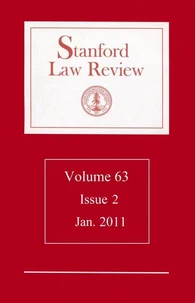Stanford Law Review: Volume 64, Issue 5 - May 2012
Par :Formats :
Disponible dans votre compte client Decitre ou Furet du Nord dès validation de votre commande. Le format ePub est :
- Compatible avec une lecture sur My Vivlio (smartphone, tablette, ordinateur)
- Compatible avec une lecture sur liseuses Vivlio
- Pour les liseuses autres que Vivlio, vous devez utiliser le logiciel Adobe Digital Edition. Non compatible avec la lecture sur les liseuses Kindle, Remarkable et Sony
 , qui est-ce ?
, qui est-ce ?Notre partenaire de plateforme de lecture numérique où vous retrouverez l'ensemble de vos ebooks gratuitement
Pour en savoir plus sur nos ebooks, consultez notre aide en ligne ici
- FormatePub
- ISBN978-1-61027-934-5
- EAN9781610279345
- Date de parution31/12/2013
- Protection num.pas de protection
- Infos supplémentairesepub
- ÉditeurMark Childress
Résumé
Contents for this 5th issue of Stanford Law Review (May 2012) include:The City and the Private Right of Actionby Paul A. DillerSecurities Class Actions Against Foreign Issuersby Merritt B. FoxHow Much Should Judges Be Paid? An Empirical Study on the Effect of Judicial Pay on the State Benchby James M. Anderson & Eric HellandNote: How Congress Could Reduce Job Discrimination by Promoting Anonymous Hiringby David HausmanThe Stanford Law Review was organized in 1948.
Each year the Law Review publishes one volume, which appears in six separate issues between January and July. This volume represents the 2011-2012 academic year. Each issue contains material written by student members of the Law Review and outside contributors, such as law professors, judges, and practicing lawyers. The journal is edited by students at Stanford Law School. In the ebook edition, all the footnotes, graphs, and tables of contents (including those for individual articles) are fully linked, properly scalable, and functional; the original note numbering is retained.
Also, the URLs in notes are active; and the issue is properly formatted for ereaders.
Each year the Law Review publishes one volume, which appears in six separate issues between January and July. This volume represents the 2011-2012 academic year. Each issue contains material written by student members of the Law Review and outside contributors, such as law professors, judges, and practicing lawyers. The journal is edited by students at Stanford Law School. In the ebook edition, all the footnotes, graphs, and tables of contents (including those for individual articles) are fully linked, properly scalable, and functional; the original note numbering is retained.
Also, the URLs in notes are active; and the issue is properly formatted for ereaders.
Contents for this 5th issue of Stanford Law Review (May 2012) include:The City and the Private Right of Actionby Paul A. DillerSecurities Class Actions Against Foreign Issuersby Merritt B. FoxHow Much Should Judges Be Paid? An Empirical Study on the Effect of Judicial Pay on the State Benchby James M. Anderson & Eric HellandNote: How Congress Could Reduce Job Discrimination by Promoting Anonymous Hiringby David HausmanThe Stanford Law Review was organized in 1948.
Each year the Law Review publishes one volume, which appears in six separate issues between January and July. This volume represents the 2011-2012 academic year. Each issue contains material written by student members of the Law Review and outside contributors, such as law professors, judges, and practicing lawyers. The journal is edited by students at Stanford Law School. In the ebook edition, all the footnotes, graphs, and tables of contents (including those for individual articles) are fully linked, properly scalable, and functional; the original note numbering is retained.
Also, the URLs in notes are active; and the issue is properly formatted for ereaders.
Each year the Law Review publishes one volume, which appears in six separate issues between January and July. This volume represents the 2011-2012 academic year. Each issue contains material written by student members of the Law Review and outside contributors, such as law professors, judges, and practicing lawyers. The journal is edited by students at Stanford Law School. In the ebook edition, all the footnotes, graphs, and tables of contents (including those for individual articles) are fully linked, properly scalable, and functional; the original note numbering is retained.
Also, the URLs in notes are active; and the issue is properly formatted for ereaders.













